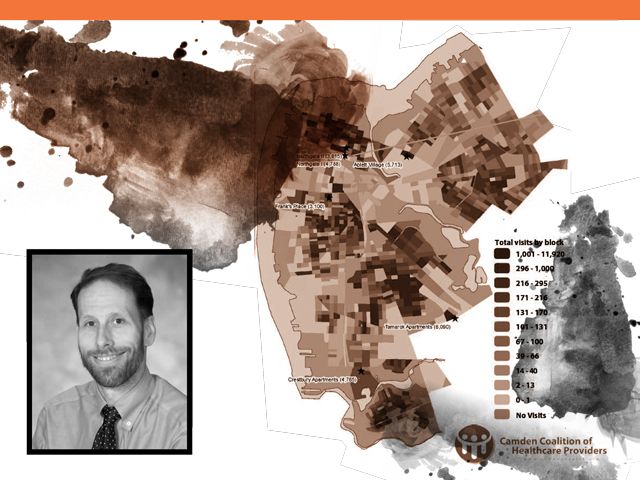Over the next two weeks, Next City will unroll short profiles of 77 people, places and ideas that have changed cities this year. Together, they make up our 2012 Disruption Index. Forefront subscribers can download the Index in full as a PDF, complete with beautiful designs and graphics by Danni Sinisi. Readers who make a $75 donation to Next City will have a full-color printed copy of the Index mailed to them.
Physician Jeffrey Brenner started out making crime maps. Frustrated with the policing in his city of Camden, N.J., Brenner wanted to fill what he saw as an obvious gap by creating a map of where crimes happened to clue in to the sort of trends that might be useful to police and beneficial to public safety. To make the maps, he convinced the three local hospitals to avail medical billing records. The trends he found in healthcare provision turned out to be far more interesting — and dysfunctional — than the crimes he’d originally intended to find. Through “hot spot” maps of medical billing, Brenner found that most of the city’s health care efforts were being spent on a very few patients, and most of those patients were relying on hospitals for fairly trivial conditions like colds, sore throats or ear infections. So he decided to do something about it.
Brenner founded the Camden Coalition of Healthcare Providers to focus on improving how health care is provided, especially to the city’s vulnerable and high-risk populations. By working with local providers and using the hot spot maps, the Coalition has successfully reduced the amount of hospital visits by nearly 50 percent. It’s a major improvement to urban health care, and it’s saving money. In 2012, Brenner spread the Coalition’s hot spotting method to four other cities, launching what could be a new model for urban health care provision.

Nate Berg is a writer and journalist covering cities, architecture and urban planning. Nate’s work has been published in a wide variety of publications, including the New York Times, NPR, Wired, Metropolis, Fast Company, Dwell, Architect, the Christian Science Monitor, LA Weekly and many others. He is a former staff writer at The Atlantic Cities and was previously an assistant editor at Planetizen.
















